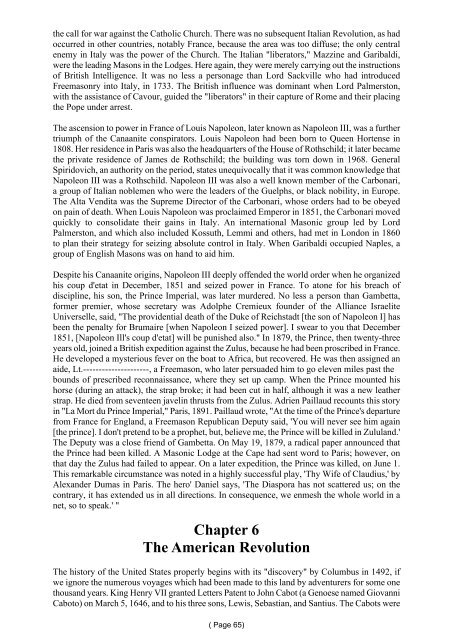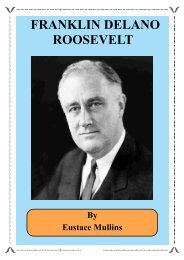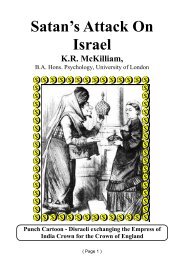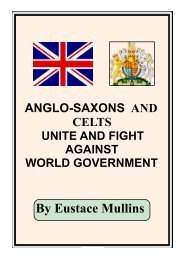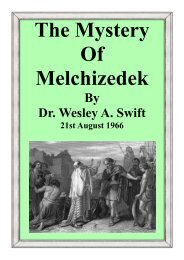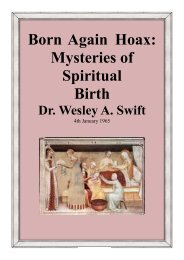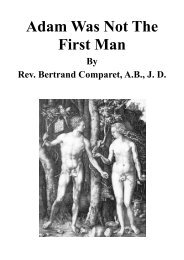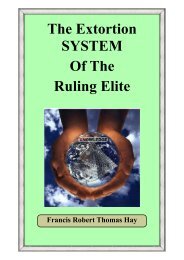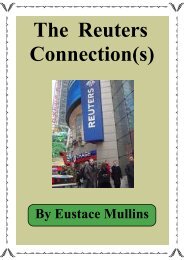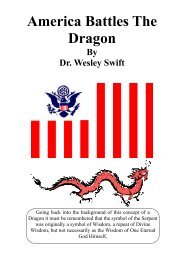Curse of Cannan - The New Ensign
Curse of Cannan - The New Ensign
Curse of Cannan - The New Ensign
Create successful ePaper yourself
Turn your PDF publications into a flip-book with our unique Google optimized e-Paper software.
the call for war against the Catholic Church. <strong>The</strong>re was no subsequent Italian Revolution, as had<br />
occurred in other countries, notably France, because the area was too diffuse; the only central<br />
enemy in Italy was the power <strong>of</strong> the Church. <strong>The</strong> Italian "liberators," Mazzine and Garibaldi,<br />
were the leading Masons in the Lodges. Here again, they were merely carrying out the instructions<br />
<strong>of</strong> British Intelligence. It was no less a personage than Lord Sackville who had introduced<br />
Freemasonry into Italy, in 1733. <strong>The</strong> British influence was dominant when Lord Palmerston,<br />
with the assistance <strong>of</strong> Cavour, guided the "liberators" in their capture <strong>of</strong> Rome and their placing<br />
the Pope under arrest.<br />
<strong>The</strong> ascension to power in France <strong>of</strong> Louis Napoleon, later known as Napoleon III, was a further<br />
triumph <strong>of</strong> the Canaanite conspirators. Louis Napoleon had been born to Queen Hortense in<br />
1808. Her residence in Paris was also the headquarters <strong>of</strong> the House <strong>of</strong> Rothschild; it later became<br />
the private residence <strong>of</strong> James de Rothschild; the building was torn down in 1968. General<br />
Spiridovich, an authority on the period, states unequivocally that it was common knowledge that<br />
Napoleon III was a Rothschild. Napoleon III was also a well known member <strong>of</strong> the Carbonari,<br />
a group <strong>of</strong> Italian noblemen who were the leaders <strong>of</strong> the Guelphs, or black nobility, in Europe.<br />
<strong>The</strong> Alta Vendita was the Supreme Director <strong>of</strong> the Carbonari, whose orders had to be obeyed<br />
on pain <strong>of</strong> death. When Louis Napoleon was proclaimed Emperor in 1851, the Carbonari moved<br />
quickly to consolidate their gains in Italy. An international Masonic group led by Lord<br />
Palmerston, and which also included Kossuth, Lemmi and others, had met in London in 1860<br />
to plan their strategy for seizing absolute control in Italy. When Garibaldi occupied Naples, a<br />
group <strong>of</strong> English Masons was on hand to aid him.<br />
Despite his Canaanite origins, Napoleon III deeply <strong>of</strong>fended the world order when he organized<br />
his coup d'etat in December, 1851 and seized power in France. To atone for his breach <strong>of</strong><br />
discipline, his son, the Prince Imperial, was later murdered. No less a person than Gambetta,<br />
former premier, whose secretary was Adolphe Cremieux founder <strong>of</strong> the Alliance Israelite<br />
Universelle, said, "<strong>The</strong> providential death <strong>of</strong> the Duke <strong>of</strong> Reichstadt [the son <strong>of</strong> Napoleon I] has<br />
been the penalty for Brumaire [when Napoleon I seized power]. I swear to you that December<br />
1851, [Napoleon Ill's coup d'etat] will be punished also." In 1879, the Prince, then twenty-three<br />
years old, joined a British expedition against the Zulus, because he had been proscribed in France.<br />
He developed a mysterious fever on the boat to Africa, but recovered. He was then assigned an<br />
aide, Lt.---------------------, a Freemason, who later persuaded him to go eleven miles past the<br />
bounds <strong>of</strong> prescribed reconnaissance, where they set up camp. When the Prince mounted his<br />
horse (during an attack), the strap broke; it had been cut in half, although it was a new leather<br />
strap. He died from seventeen javelin thrusts from the Zulus. Adrien Paillaud recounts this story<br />
in "La Mort du Prince Imperial," Paris, 1891. Paillaud wrote, "At the time <strong>of</strong> the Prince's departure<br />
from France for England, a Freemason Republican Deputy said, 'You will never see him again<br />
[the prince]. I don't pretend to be a prophet, but, believe me, the Prince will be killed in Zululand.'<br />
<strong>The</strong> Deputy was a close friend <strong>of</strong> Gambetta. On May 19, 1879, a radical paper announced that<br />
the Prince had been killed. A Masonic Lodge at the Cape had sent word to Paris; however, on<br />
that day the Zulus had failed to appear. On a later expedition, the Prince was killed, on June 1.<br />
This remarkable circumstance was noted in a highly successful play, 'Thy Wife <strong>of</strong> Claudius,' by<br />
Alexander Dumas in Paris. <strong>The</strong> hero' Daniel says, '<strong>The</strong> Diaspora has not scattered us; on the<br />
contrary, it has extended us in all directions. In consequence, we enmesh the whole world in a<br />
net, so to speak.' "<br />
Chapter 6<br />
<strong>The</strong> American Revolution<br />
<strong>The</strong> history <strong>of</strong> the United States properly begins with its "discovery" by Columbus in 1492, if<br />
we ignore the numerous voyages which had been made to this land by adventurers for some one<br />
thousand years. King Henry VII granted Letters Patent to John Cabot (a Genoese named Giovanni<br />
Caboto) on March 5, 1646, and to his three sons, Lewis, Sebastian, and Santius. <strong>The</strong> Cabots were<br />
( Page 65)


